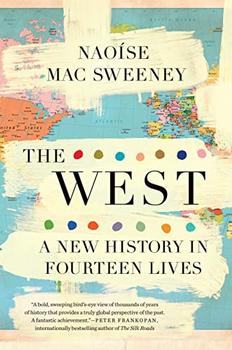Summary | Excerpt | Reviews | Beyond the Book | Readalikes | Genres & Themes | Author Bio

A New History in Fourteen Lives
by Naoíse Mac Sweeney
And in July 2021, as the Russian army massed at the Ukrainian border in advance of a military invasion, Russia's president, Vladimir Putin, published a treatise arguing the historical unity of the Russian and the Ukrainian peoples.
You do not necessarily have to be malicious or mendacious to want to rewrite history according to your political agenda, nor must you necessarily falsify history to do so. Rewriting the past can also take the form of choosing to include facts that were previously written out of a conventional narrative. In 2020, the National Trust in Britain published a report on the connections between colonialism, slavery and the historic buildings in the Trust's care, further enflaming the tensions in an already-heated national debate about Britain's imperial past. On one side, some argue that uncomfortable histories of colonialism, slavery and exploitation should feature more prominently in the school curriculum and as part of the public information available at museums and other heritage sites. While these arguments are driven by historical fact, they are also fundamentally political, underpinned by political principles and driven by a political agenda that argues for greater social justice and the recognition of historical wrongs. The opposing argument – that these uncomfortable topics should not be given more prominence, and that emphasis should instead be placed on positive themes – is also driven by a political agenda, albeit one that argues for maintenance of the status quo.
This debate demonstrates two important things. The first is that all history is political. Choosing to rewrite, reconsider or revise the official history is a political act. But equally, choosing not to rewrite it is also a political act. The second important thing is that the historical facts themselves are not always under dispute. Rather, the debate can focus on which facts should be emphasised, where and when. Reflecting on these two points, we must conclude that there is nothing intrinsically wrong with writing history from a political standpoint.
this is the only way that history can be written! But there is a problem if the history that you write contradicts the available facts.
This is one of the main problems with the grand narrative of Western Civilisation. The evidential basis for it has long crumbled, and while individual elements can be retained, the overall narrative is no longer consistent with the facts as we know them. Yet some in the West still cling to this grand narrative for its ideological value. This brings us to the second of the big problems with the grand narrative of Western Civilisation: its underpinning ideology no longer reflects the principles of the modern West. The guiding ideologies of Western society in the mid-twenty-first century are different from those of the mid-nineteenth, when the grand narrative was at its zenith, and from those of the mid-eighteenth, when the narrative was first emerging. For many people within the West today, notions of White racial superiority and imperialism no longer lie at the heart of Western identity. Instead they have been replaced with an ideology based on liberalism, social tolerance and democracy. (There are also significant numbers of people within the West who disagree, and who would rather regress to the nineteenth-century model of Western identity, but I shall discuss them in more detail in the conclusion.)
We must rid ourselves of the grand narrative of Western Civilisation, putting it firmly aside as both factually incorrect and ideologically outdated. It is an origin myth that is no longer fit for purpose – it provides neither an accurate account of Western history nor an ideologically acceptable basis for Western identity. My aim in this book is therefore to tackle the grand narrative of Western Civilisation, first unpicking the micronarratives that comprise it, and then unpacking the ideological baggage that rests upon it.
Excerpted from The West by Naoíse Mac Sweeney. Copyright © 2023 by Naoíse Mac Sweeney. Excerpted by permission of Dutton. All rights reserved. No part of this excerpt may be reproduced or reprinted without permission in writing from the publisher.




The good writer, the great writer, has what I have called the three S's: The power to see, to sense, and to say. ...
Click Here to find out who said this, as well as discovering other famous literary quotes!
Your guide toexceptional books
BookBrowse seeks out and recommends the best in contemporary fiction and nonfiction—books that not only engage and entertain but also deepen our understanding of ourselves and the world around us.